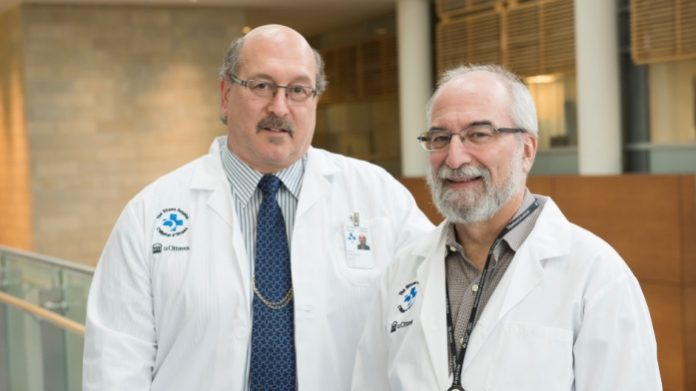“It started as numbness on my left temple and progressed very rapidly over the next 6 months. It started affecting my balance, my energy levels, the strength in my legs.”
These were the first signs of multiple sclerosis (MS) that Alex Normandin experienced in the fall of 2006, just as he was starting his 3rd year of medical school. He was forced to leave school.
Ten years later, thanks to a stem cell treatment administered by a team of Ottawa doctors, Alex is a practicing family doctor, his disease progression stopped and some symptoms even reversed. The results of this clinical trial were published last week in The Lancet medical journal.
You against you
MS is an autoimmune disease in which your own immune system attacks the protective sheath that surrounds your nerve cells. Without this sheath, the nerve cells can’t properly relay messages from the brain to the rest of your body, causing symptoms such as extreme fatigue, lack of coordination, weakness, and vision problems.
The solution? Get a new immune system.
Though it may sound radical, it’s actually not that different from bone marrow transplants for cancer patients – a procedure that has been done successfully since the 1950’s.
“It was actually based on some of those principles that we decided to try this for patients with autoimmune diseases,” says Dr. Harold Atkins, a physician at the Ottawa Hospital and Associate Professor at the University of Ottawa, who co-led the study with Dr. Mark Freedman. The project was funded by the MS Society of Canada and its affiliated Multiple Sclerosis Scientific Research Foundation.
First, blood stem cells were collected from each patient. This was followed by aggressive chemotherapy to completely eliminate the patient’s current, faulty immune system. The immune system was then repopulated with the patient’s own blood stem cells with the hope that these new immune cells would no longer recognize the nerve sheaths as something to attack.
And it worked. 70% of trial participants experienced a complete stop in disease progression while 40% experienced some lasting reversal of symptoms.
Not for everyone
Despite these exciting results, there are serious side effects to having your immune system wiped out. One patient died during the trial.
“It was as miserable as it gets,” says Normandin. “It’s hard to even describe. It just kind of takes everything out of you. But I never had any regrets. I was always pretty sure I was doing the right thing.”
But for the majority of MS patients that successfully manage their disease with medication, this intense procedure is likely not worth it.
“You have to balance the risks and potential benefits of the treatment,” says Dr. Atkins. “This is probably for the 5% of patients with the most aggressive MS.”
The treatment is also not likely to benefit those that have already had MS for a long time, when the disease becomes less immune-based and more neurodegenerative.
“This is not magic. Later on, the immune system is less important, and so this treatment would be less important. It’s not designed to repair the brain,” explains Dr. Atkins.
Not just genes
Though our understanding of MS has improved enough to find some successful treatment and management options, questions still remain. For example, what causes your immune system to mistakenly attack a part of you?
Genetics certainly plays a role: a recent study from the University of British Columbia identified a single gene mutation that predicted MS with high probability. But genetics is clearly only part of the story, otherwise a treatment that uses your own stem cells, with the same DNA, would never work. There is still much to uncover.
“Our groups that work in this field are talking about the next steps, what the next trial should be, what we want to demonstrate next. That’s ongoing research,” says Atkins.
In the meantime, patients with early, aggressive MS have another option and renewed hope.








































